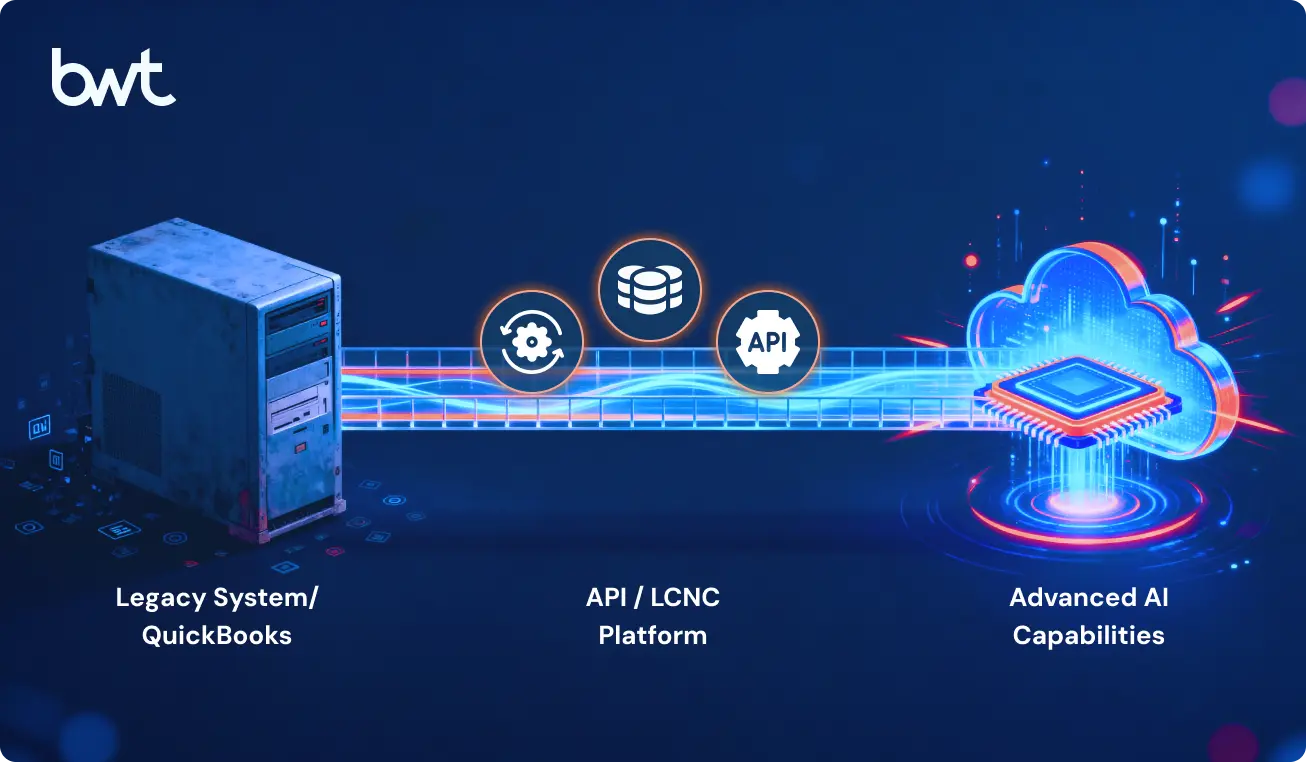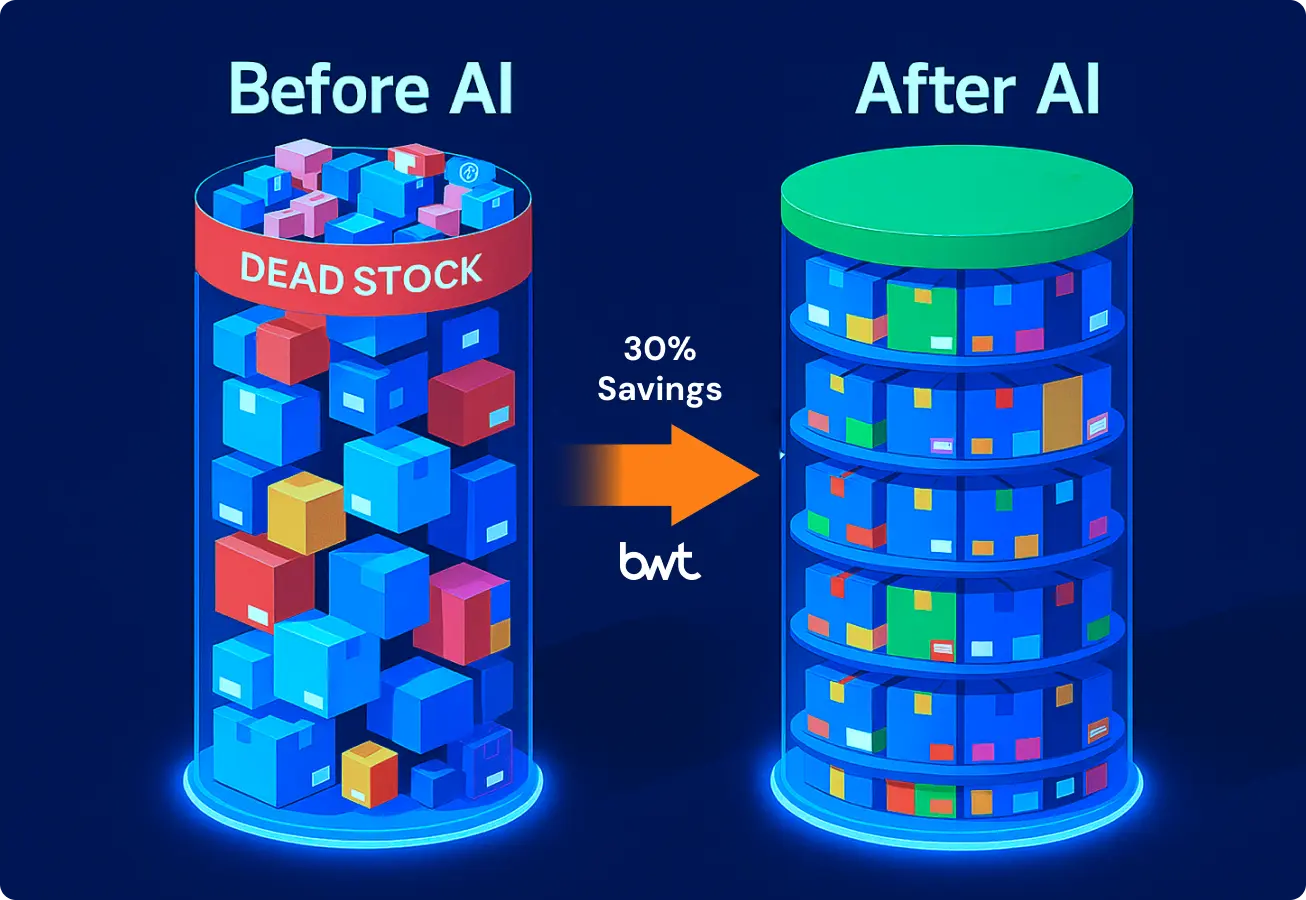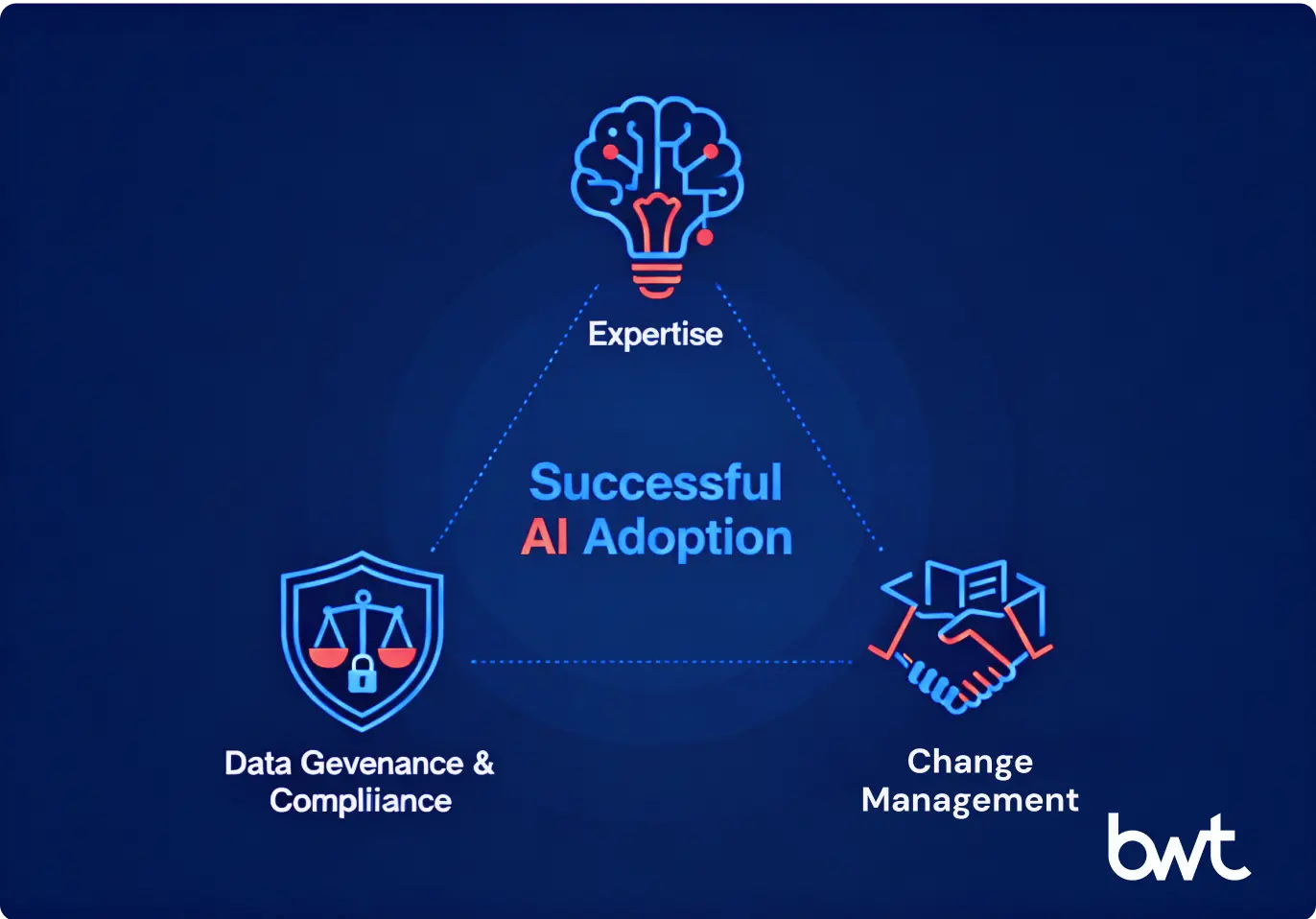Artificial intelligence (AI) is no longer an optional luxury; it’s a foundational competitiveness requirement. Small and Mid-market Enterprises (SMEs) face intense pressure: limited technical resources, inflationary costs, and constant innovation demands. Ignoring this shift risks market decay.
AI consulting for small businesses closes the ambition-to-technology gap. Consultants transform operational pain points (excessive support loads or high inventory waste) into structured projects with predictable, measurable outcomes. The delivery team guarantees, for example, a documented 30% reduction in overstock costs for regional distributors. This guidance helps firms move beyond basic tools to customized solutions that deliver wins in revenue, cost reduction, and client retention.
Executive Summary: AI Integration Funds Growth
Market analysis shows competitors define AI services and list common applications like chatbots. Executives move fast. Systems don’t. Most guides fail to deliver deep, actionable solutions for critical adoption barriers. Limited budgets, internal expertise shortages, and complex integration frequently block growth. The critical strategic shift involves leveraging rapid, incremental ROI (via LCNC) to fund the long-term, defensible growth strategy (via data governance).
The integration challenge with legacy systems—QuickBooks or older CRMs—remains largely unaddressed. Data quality, complexity, and governance, non-negotiable for successful AI deployment, often lack practical frameworks.
The firm’s proprietary consulting research leverages quantifiable ROI metrics derived from client case studies. The firm’s internal data documents that average savings, observed across SMEs with an operational expenditure above $20,000 monthly, often range between $500 and $2,000 monthly.
AI consulting services for small businesses dedicate comprehensive sections to low-cost integration strategies (LCNC) and the API-first approach. This operational approach ensures that limited capital delivers rapid, measurable financial returns, securing the internal budget necessary for subsequent data governance and scalable growth. The structure details robust risk mitigation via data governance. This integrated model is the core growth strategy tailored to small business operational constraints.
Defining AI Consulting: Essential for Risk Mitigation
AI consulting defines a specialized practice. It helps SMEs apply advanced AI technologies, including Generative AI, machine learning, and predictive analytics. The service goal is strategic application, not technical deployment. It solves concrete business problems and optimizes overall operations.
The Service Role: Strategic Roadmapping
Consultants build the strategic roadmap. They translate complex technical options, cloud costs, and deployment risks into clear, actionable plans. Expert counsel remains essential.
Small businesses cannot feasibly recruit or retain specialized internal teams. AI consulting services for small business establishments guide clients through necessary implementation models: Assisted Intelligence, Augmented Intelligence, and Autonomous Intelligence. The primary value generated by AI consulting involves risk mitigation. Unguided AI projects incur massive costs; experts ensure limited budgets target measurable wins.
Overcoming Unique Adoption Challenges
SMEs face adoption barriers distinct from large corporations. Expert AI consulting for small businesses must address structural limitations directly.
Budget Constraints Require Prioritization
Cost perception and genuine budget limits challenge firms. Small firms prioritize capital expenditure. The consulting solution focuses on strategic project prioritization and speed-to-value.
Initial investments target low-cost, high-leverage solutions. For example, consultants start with integrating tools like an OpenAI API to enhance existing CRMs for instant lead qualification. This approach avoids major software purchases. It utilizes Google Sheets/Airtable with basic AI functions for primary data analysis, which builds internal confidence and justifies the continued investment.
Data Quality Requires Governance Frameworks
Successful AI relies entirely on high-quality data. Many SMEs lack the infrastructure for robust data collection; this creates quality issues. Poor data quality prevents firms from realizing AI solution benefits.
Consultants counteract this. They implement robust data governance frameworks. This specialized service ensures data becomes a critical, secure, and accurate business asset. AI governance is non-negotiable for risk management. Strong frameworks ensure regulatory compliance and mitigate model bias risk. The delivery team provides transparency and auditability necessary to maintain stakeholder trust.
Integrating AI with Legacy Systems

Many small businesses rely on proprietary legacy systems (accounting, CRM). Outdated architecture creates significant technical limits. Our solution involves strategic modernization without full infrastructure replacement. Capital preservation is the core strategy.
Consultants guide the adoption of Low-Code/No-Code (LCNC) AI platforms and AI-as-a-Service (AIaaS). Application Programming Interfaces (APIs) allow seamless, incremental integration. This approach is challenged when legacy systems possess closed or poorly documented APIs; the delivery team then implements middleware solutions or data scaffolding to bridge the gaps. This LCNC focus is unique to SME consulting, enabling legacy systems to access advanced AI capabilities faster and cheaper than traditional development. This high-speed, low-capital-risk approach delivers the rapid ROI necessary to fund deeper strategic data investments.
Value Delivery: Expertise and Change Management
Talent acquisition presents a formidable challenge. Demand for skilled AI professionals outstrips supply; high compensation remains financially infeasible for small companies.
AI consulting for small businesses provides immediate expertise access. This avoids the high, long-term costs associated with building an internal team. Outsourcing provides the necessary strategic advice without substantial financial commitment.
Change Management Ensures Adoptions
Sophisticated AI systems fail without employee buy-in. Internal resistance presents a major hurdle. Consultants establish formal training.
This educational approach ensures staff proficiency. It fosters a collaborative culture. Successful adoption demands smooth transitions. Continuous upskilling is necessary. AI consulting for small businesses ensures this smooth transition.
High-Impact Use Cases Drive Consequences
Investment in AI consulting justifies itself through profound operational improvements. These benefits of AI consulting for small businesses translate directly into efficiency gains and enhanced revenue streams.
Revenue Generation
AI fundamentally changes sales and marketing. AI tools automate lead generation and personalize campaigns. Marketing agencies report conversion uplifts as high as 25%. This directly lowers the Cost of Customer Acquisition (CAC).
Nearly half of small business marketers use AI for ad targeting; this consistently leads to improved conversion rates.
Customer Service and Engagement
AI-powered chatbots provide instant, round-the-clock responses. Staff reallocate to complex issues. Businesses using AI support report a 72% increase in faster resolution times.
Chatbot implementation raises client retention rates by 20%.
Operational Efficiency
AI automation increases efficacy. It frees staff from mundane work. Owners report saving over 20 hours monthly in productivity.
Manufacturing SMEs see efficiency gains of 40% in production cycle speed. This acceleration allows firms to bid competitively on high-volume contracts. AI processes invoices ten times faster than manual methods.
Predictive Analytics and Inventory

Maintaining optimal inventory remains a challenge. AI models analyze demand and historical data to prevent costly over- or under-stocking.
For instance, a regional electronics distributor cut overstock costs by a documented 30%. They saved an average of $1,200 monthly by optimizing seasonal ordering patterns. This delivers substantial, measurable cost savings, directly protecting margin from market volatility.
Quantifying ROI for Decision Making

A small business justifies AI investment through clear, rapid ROI.
Note: All metrics in this section reflect average outcomes observed within the firm’s portfolio of SME consulting engagements.
Financial Metrics and Profitability
The firm’s internal data documents that AI adoption delivers a measurable financial impact. Average cost savings observed across the client base range between US$500 and US$2,000 per month. These savings reflect OpEx reductions, primarily in administrative and inventory overhead, for firms operating with monthly expenses above $20,000.
The benefits of AI consulting for small businesses are clearly evidenced by the fact that a strong majority of small businesses investing in AI—66%—report improved overall profitability. Increased revenue necessitates growth in high-value roles. This is evidenced by the finding that 82% of U.S. small businesses using AI increased their workforce.
| Area of Improvement | Outcome Metric | Value Type |
| Monthly Cost Savings | US$500–$2,000 in operational costs (average) | Direct Financial |
| Customer Experience (CX) | Up to 250% ROI increase via satisfaction | Long-Term Value (LTV) |
| Inventory Management | Cut overstock costs by up to 30% | Operational Efficiency |
| Lead Generation | 35% increase in qualified leads | Revenue Growth |
| Administrative Productivity | 20+ hours per month saved | Time Savings |
| Sales Pipeline | 30% increase in sales pipeline (Manufacturing SME) | Direct Growth |
Selecting the Right Partner: The Roadmap
Selecting an expert partner is critical. Finding the best AI consulting for small businesses requires due diligence based on practical, measurable outcomes.
Key Selection Criteria
The partner must deliver a customized solution. Generic models fail. Proven expertise within the business sector remains essential.
The consultant must articulate a clear ROI. They ensure the launch and ongoing support costs balance cutting-edge technology with affordability. AI implementation is a continuous process. The delivery team provides continuous support, managing the transition by training employees for smooth adoption.
Engagement Roadmap: Assessment to Optimization
A structured engagement roadmap ensures alignment. This process minimizes execution risk.
- Phase 1: Needs Assessment. The process begins with comprehensive infrastructure analysis. The firm establishes goals: reducing costs, increasing engagement, or boosting sales. This phase ensures the consultant understands the organizational context.
- Phase 2: Strategy Development. The consultant develops an actionable AI strategy. This aligns appropriate technology (Generative AI or predictive modeling) with business objectives. The plan selects technology platforms and balances cost against returns.
- Phase 3: Implementation. The consultant guides AI solution deployment. Integration uses tools like APIs and cloud-based systems. A vital component sets guardrails for data privacy and model governance. This turns technical deployment risks into a clear, executable plan.
- Phase 4: Ongoing Support. AI consulting for small businesses views AI use as an ongoing process. The consultant provides continuous learning programs. Monitoring performance feedback remains crucial for optimal results. This continuity solidifies long-term value.
Conclusion: Future-Proofing Through Investment
Expert guidance provided through AI consulting for small businesses remains essential for thriving. Consultants address core challenges: capital, personnel skills, infrastructure stability, and data integrity. They provide the competitive edge necessary to compete.
Evidence demonstrates AI adoption leads to significant, rapid ROI. Strategic investment in AI consulting allows these firms to streamline projects. They accelerate workflows and build a robust, data-driven culture. Executives who adapt will cut inventory volatility by 30% and preserve margin in compressed cycles.
FAQ
-
Do I need “AI consulting for small businesses near me”?
Physical proximity is not critical. Modern Cloud AI minimizes the importance of location. Remote expertise often proves more accessible and cost-effective. SMEs must prioritize the consultant’s experience in change management and regulatory compliance over their address. We leverage AI tools to enhance hyperlocal personalization for your business, regardless of our base location.
-
How quickly will we see the first ROI?
The first measurable ROI should appear within 3–6 months after completing Phase 1: Needs Assessment. Consultants target initial investments toward projects with high speed-to-value, such as customer support automation. These early successes, for example, a 15% reduction in support load, finance subsequent, more complex phases.
-
What is the cost of the initial assessment (Needs Assessment)?
The cost of the initial strategic planning stage, which includes the Needs Assessment, is fixed and low compared to full implementation. It is designed as a strategic entry ticket to minimize risk before committing capital. Consultants clearly delineate the cost of the assessment from the cost of subsequent tools (Low-Code/No-Code).
-
What ethical and legal risks exist beyond model bias?
Legal risks extend beyond model bias and regulatory compliance. Owners are responsible for data sovereignty and the security of client data when using third-party APIs (like OpenAI). Our consulting ensures the deployment of protective guardrails and develops data ownership policies to maintain trust and prevent privacy violations.
-
Do we need our own internal IT staff to support AI solutions?
AI consulting provides immediate access to expertise. Initially, dedicated IT staff is not required. We deploy LCNC solutions and AI-as-a-Service, which demand minimal internal upkeep. However, for long-term resilience, companies should assign one internal champion to monitor performance and manage internal training programs.





